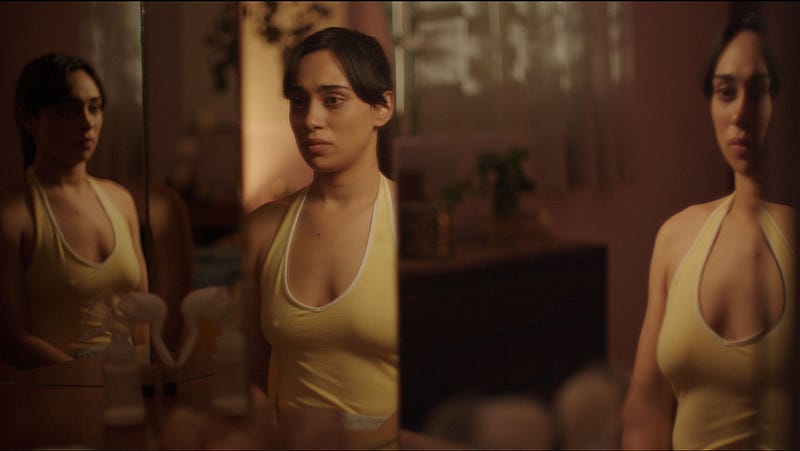Michelle Garza Cervera makes her mark on Mexican folk horror with her (bone) crackingly good directorial debut

Change can be painful, and is an inevitable consequence of life. Perhaps nothing encapsulates this more than the process of birth. The preparation, the aftermath, and, significantly, the contortive acts a woman’s body performs to bring forth the life that has grown within. The experience for many is akin to horror, which is literally the case for Valeria (Natalia Solián). Her life with her husband Raúl (Alfonso Dosal), seems idyllic, until she finally conceives the child they have been hoping for. An initial joyful period soon becomes tinged with darkness. Conflict with her family and concerns about her fitness as a mother are bad enough, but pale in comparison to the faceless and fractured woman who plagues her. A scuttling figure, accompanied by the sound of cracking bones, whose acts and appearances become more disturbing and tangible. As the danger to Valeria and her family becomes clear, she seeks out help to lift this curse.
Writer-director Michelle Garza Cervera, along with co-writer Abia Castillo, draw from the story of La Huesera, ‘the Bone Woman’, who according to Mexican folk-tale, collected the bones of wolves to build a skeleton of a woman. Once it was complete, she sang it to life, before setting her free. This evocative lore is hauntingly rendered in this rumination on the looming specter of motherhood. Carrying a child is a period of adjustment and preparation. Not just in a physical sense, but in a reordering of one’s self. Valeria is encompassed by a growing self-doubt, and doubt from those around her. A family who have little faith in her abilities as a mother after a babysitting incident when she was a teenager. Every change, such as putting away her workshop to replace it with a nursery adds to the difficulty of the transition. Another sacrifice of part of her identity to assume a new one. Physically agitated, Valeria cracks her fingers and back, stress responses, but also symbolically showing her breaking and reforming herself to conform and better fit her changing life. Actions that evoke the spirit casting its shadow over her life. But, even after the birth, waves of depression and loneliness plunge her psyche deeper into darkness.

Valeria looks to find reassurance in her past, with flashbacks showing her as a transgressive young teenager, and in present day finding solace in a return to her past life of punk concerts and first love, Octavia (Mayra Batalla). These punk roots are skillfully woven into the film, both in terms of a style and ethos than invokes rebellion, and also as evidence of Valeria finding real support with a family of her own choosing. It is these elements that take Huesera beyond motherhood into a wider exploration of societal expectations and pressure, most pertinently Catholicism and the position of the mother in Mexican culture. Valeria’s aunt is herself labelled as a weird spinster for embracing independence and a queer lifestyle. She is also the only unwavering source of support and love in this poor girl’s life, and a bridge to a coven of women who possess the ability to purge Valeria of this dark spirit. It is poetic that a similarly outcast soul is the one to give her hope.
Director Michelle Garza Cervera deftly uses this dip into the horror genre to drive home her grasp of film-making. Huesera is haunting in tone, delivering visceral moments, indelible imagery, and brutally effective sound design. Natalia Solián delivers a tour de force performance, raw and open, baring herself in practically every scene, and beautifully conveying the journey this young woman takes. From joy, to dread, through despair, and finally to the hope that comes with the film’s cathartic denouement. A call for women to embrace the truth about who they want to be, and affirm their right to choose.




